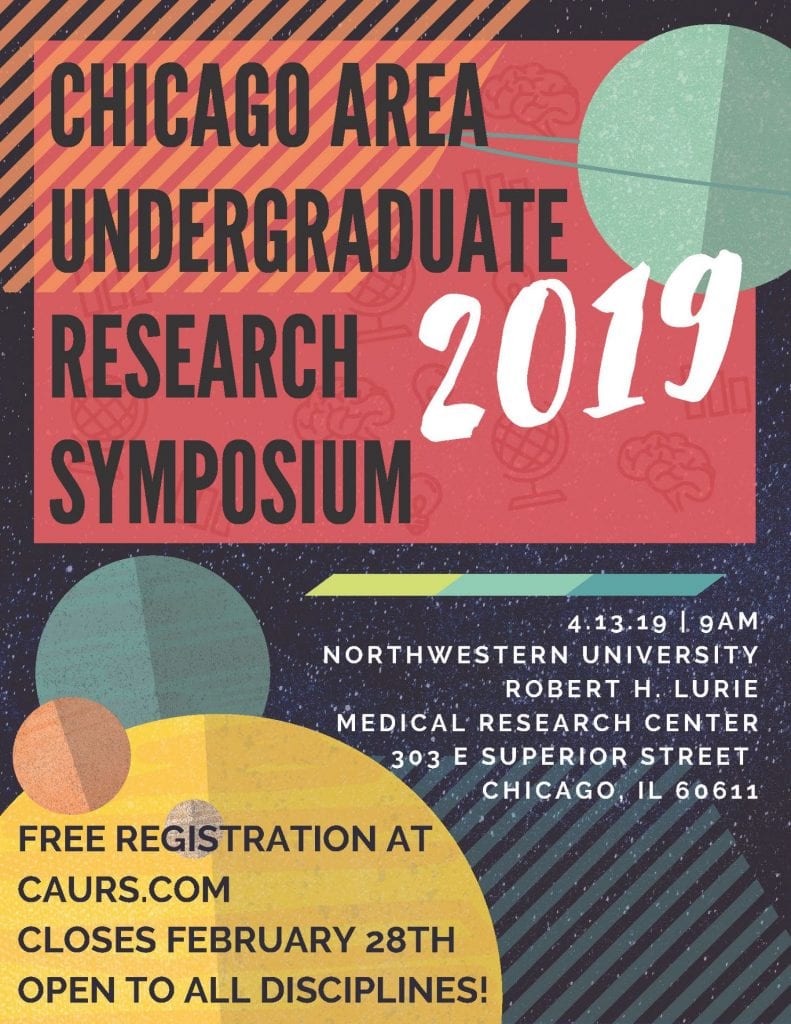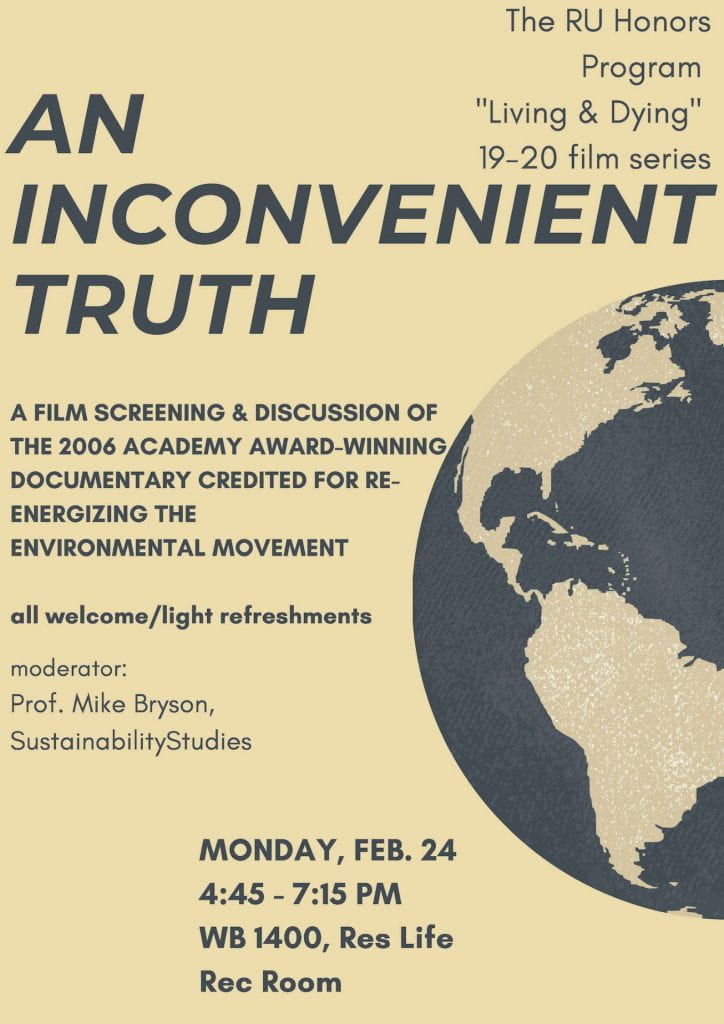 Please share this pdf version of the event flier!
Please share this pdf version of the event flier!
Category: Education
Grad School A-Z / McNair Scholars Program
Today 11/12 at 4:30pm, the College of Arts & Science Student Advisory Council (CASSAC) is hosting a workshop – Grad School: A to Z – at the Chicago Campus, Wabash Building, room 317. The workshop is open to all Roosevelt students interested in attending graduate or professional school and will cover topics ranging from how to begin the application process, crafting/revising personal statements, and much more. Students will have an opportunity to meet and speak with a panel of Roosevelt faculty (including yours truly) and staff.
For more information, contact cassac@roosevelt.edu — hope to see you there!
Also, Fri 11/15 is the deadline to apply to the McNair Scholars Program, a tremendous opportunity for first-generation and under-represented undergrads interested in pursuing doctoral research after your graduation from RU. Access information & application instructions here:
https://www.roosevelt.edu/current-students/academics/mcnair
The mission of the McNair Scholars Program at Roosevelt University is to provide promising undergraduates with the knowledge necessary to achieve and successfully complete a doctoral degree. The McNair Scholars program accomplishes this through enhancement workshops, advanced research, a mentoring program, and a supportive atmosphere.
McNair students are required by their senior year to complete a number of scholarly activities as they prepare to apply for graduate school and graduate funding opportunities. McNair students benefit from a summer research program, presenting research at professional conferences, visits to graduate schools they are interested in attending, academic counseling, course tutoring, preparing for GRE exams, and receiving advice and assistance with the graduate school selection and application process. The McNair Scholars Program is committed to helping students build solid foundations in their professional and personal relationships through mentoring, community building activities, and nurturing a sense of accomplishment in their educational goals at the end of their program.
Now Hiring Sustainability Student Associate Positions for Fall 2019 @RooseveltU
The Sustainability Studies Program @RooseveltU is hiring two (or more) undergraduate students to serve as Sustainability Student Associates for the Fall 2019 semester. Information and application instructions for the position can be found on Student Employment website: to apply, just login to the Career Central job posting system and upload your letter of interest and cover letter.
Deadline for applications is Tuesday 9/3/19. Interviews will be conducted that week in person or via Zoom with the goal of hiring by the week of 9/9. Depending upon the applicant pool, the available hours (30/week) may be split among 2-4 students. A cover letter, updated résumé, and writing sample (which can be paper written for an RU class) are required for your application. Your letter should explain your interest in advancing campus sustainability as well as highlight your prior knowledge about and/or skills in relevant sustainability issues and practices (e.g., recycling, gardening, event planning, data analysis, student outreach, etc.)
Desired Majors: Sustainability Studies, Sociology, or Biology preferred; however, all majors will be considered.
Required Skills/Knowledge: Knowledge of and interest in sustainability; strong writing/editing skills; effective communication skills; dependability and strong work ethic.
These 15 hour/week at $13/hour student positions support the mission, pedagogy, and service work of the SUST Program at Roosevelt by the following (other duties as assigned):
- developing & supporting campus sustainability projects in consultation with the program director, department faculty, Operations and Planning staff, and the RU Green student organization;
- managing the Roosevelt Urban Sustainability Lab (RUSLab) & WB Rooftop Garden;
- providing logistical and communication support for sustainability-related activities, events, and projects, both on- and off-campus;
- supporting student experiential learning, recruitment, retention, & career development efforts;
- coordinating & promoting departmental events & campus outreach (e.g., Campus Sustainability Month [October], SUST Symposia, & Earth Month);
- performing current student and alumni outreach;
- serving as the primary student liaison between the SUST Program and the university community in the advancement of RU’s 2015-2020 Strategic Sustainability Plan
Student Associates will work closely with the SUST Program Director, Prof. Mike Bryson, and utilize the RUSLab at the Chicago Campus as their home base. Funding for the positions is provided by federal work-study funds as well as Testa Produce of Chicago.
Please email Prof. Bryson (mbryson@roosevelt.edu) for questions about the position or application process.
Earth Month 2019 @RooseveltU: Get Involved and Go Green!
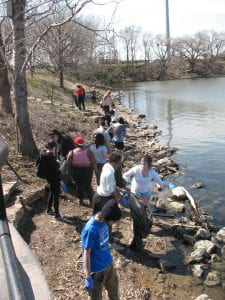
This April is #RUEarthMonth2019, and there are lots of ways to go green at Roosevelt as part of our campus sustainability efforts — from recycling and composting promotional events to fun urban ag field trips to our annual sustainability symposium. We’ll add to and update this list as the month unfolds, so please check back frequently!
All Month — Participate in RU’s waste reduction efforts every day by using and promoting our new compost bins, which are now located literally everywhere. help us divert waste from the landfill and reduce our GHG emissions by rinsing out your recyclables and putting biodegradable waste in the compost. It’s easy and fun!
All Month — Environmental Justice and Policy online activism: Students, please take this 1-minute survey developed by the SUST 250 Sustainable University water team about bottled water usage here on campus. All, please read this environmental justice petition from our friends at the Southeast Environmental Task Force, where recent RU alum Yessenia Balcazar (BA ’18, Sustainability Studies) works as an EJ advocate; please sign and share as your conscience dictates.
Fri 4/19 & 4/26 — Field Trip to Washington Park Youth Farm with Windy City Harvest: Join SUST Prof Vicki Gerberich and students in her SUST 230 Food class on this urban ag field trip. Open to students, faculty, staff, & alumni. Small fee, big-time fun. Details here!

Mon 4/22 — Earth Day is here! Get outside if you can, rain or shine. Then, when you come back inside, join students from the SUST 250 Sustainable University class and RU Green as they promote our new composting initiative in that nexus of RU food consumption, the RU Dining Center, from 12-5pm. There may be prizes (or at least a pleasant endorphine rush) for tossing your stuff in the right bin. Plus, you can avoid otherwise unpleasant tasks by taking an Earth Day Quiz and reading these Earth Day Tips!
Tues 4/23 — RU Green Nature Outing: Join students from the environmental org RU Green on an urban nature adventure to McKinley Park, where they’ll help out the park by picking up litter and planting seeds, then have a nice little picnic. Meet at the SUST Lab, AUD 526, at 5pm; RSVP to RU Green president Samantha Schultz (sschultz10@roosevelt.edu).

Wed 4/24 — WB Rooftop Garden Work Day: Fresh air and fun! Get your hands dirty with those tireless and enthusiastic students from RU Green as they work on our 5th story Rooftop Garden from 5-6pm. Space is limited, so RSVP to RU Green president Samantha Schultz (sschultz10@roosevelt.edu) to save your spot. Bring extra oxygen for working at high altitude. (Just kidding. Work gloves would be good, though, if you’ve got ’em.)
 Thurs 4/25 — Meet Recycling & Composting Expert Rebecca Quesnell: One of the living legends among the many SUST alumni working for positive change out there in this great big world of ours is Rebecca “Beeka” Quesnell (BA ’15 Sustainability Studies), who now works as the Sustainability Coordinator for Independent Recycling Services. That’s huge, because Independent collects RU’s recyclables at the Chicago Campus! Stop by the info table in the WB Lobby from 11:30am-2pm to chat with Beeka and current SUST students, get your burning questions about recycling/composting answered, and feel enlightened.
Thurs 4/25 — Meet Recycling & Composting Expert Rebecca Quesnell: One of the living legends among the many SUST alumni working for positive change out there in this great big world of ours is Rebecca “Beeka” Quesnell (BA ’15 Sustainability Studies), who now works as the Sustainability Coordinator for Independent Recycling Services. That’s huge, because Independent collects RU’s recyclables at the Chicago Campus! Stop by the info table in the WB Lobby from 11:30am-2pm to chat with Beeka and current SUST students, get your burning questions about recycling/composting answered, and feel enlightened.
Thurs 4/25 — RU Green Farmers Market Outing: Join those always-adventure-seeking students from RU Green on a jaunt to one of Chicago’s many urban farms and markets, Growing Home, at their Wood Street Urban Farm Stand. Meet at the SUST Lab, AUD 526, at 12:45pm; RSVP to RU Green president Samantha Schultz (sschultz10@roosevelt.edu) to let her know you’re coming.
Fri 4/26 — Field Trip to Growing Home Farm at 1pm. Because you really can’t go to Growing Home enough, can you? Yet another outstanding field trip opportunity with SUST Prof Vicki Gerberich and students in her SUST 230 Food class. Growing Home has been using urban agriculture as a catalyst for change for over a decade in Englewood, an underserved community on Chicago’s South Side. Open to students, faculty, staff, & alumni. Details and RSVP here!
Sat 4/20 & Sat/Sun 4/27-28 — Earth Day Service Opportunities & Events throughout Chicago, sponsored by the Chicago Conservation Corps (C3) and other organizations. Check out the many events listed here by C3 as well as these by the Cook County Forest Preserves. Help clean up parklands, restore natural areas, and meet conservation-minded and nature loving sustainability nerds from across the city. Fun and rewarding in a deeply spiritual and dirt-under-your-nails kind of way!
Wed 5/1 — SUST Student Symposium: An annual festival of student creativity and action research that features four team presentations by RU undergraduate students in Prof. Mike Bryson’s SUST 250 The Sustainable University class. Food. From 2-4pm in WB 1214, teams will describe their work on campus sustainability projects on food waste reduction in the Dining Center, recycling/composting in the WB Dormitory, rooftop gardening, solar energy generation, and water conservation. Free food. From 4-5pm we’ll feature two individual presentations: SUST senior Bria Jerome will recount her adventures this spring as RU’s first-ever intern at Seven Generations Ahead in Oak Park and Chicago; and distinguished SUST alum Yessenia Balcazar (BA ’18) will talk about her path from RU to working with the Southeast Environmental Task Force on the front lines of the environmental justice on Chicago’s Far South Side. Did I mention food above? [Quite possibly.] Yes, refreshments will be served! RSVP to Prof. Mike Bryson (mbryson@roosevelt.edu) to feed your brain AND your belly.
Wed 5/8 — Bubbly Creek Clean-up: Join students in Prof. Mike Bryson’s SUST 250 Sustainable University class on the field trip to Canal Origins Park on Chicago’s Near Southwest Side, where we’ll continue our yearly tradition of picking up litter along the riverbanks of Bubbly Creek where it meets the South Branch of the Chicago River. Enjoy great views of the Chicago skyline, fresh air, and a gratifying sense of fun and companionship as we work together to clean up our adopted city park! Meet at 2pm in the WB Lobby; RSVP to Prof. Mike Bryson (mbryson@roosevelt.edu) with questions and to confirm attendance.
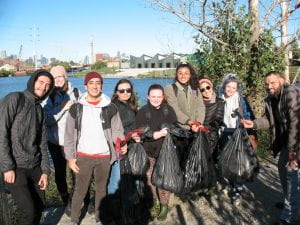
This event list will be updated throughout Earth Month and maybe a little bit beyond.
Chicago Area Undergraduate Research Symposia in April 2019 & RU Workshop this Friday 2/22
This is a great opportunity for RU students in all disciplines to present their research, get public speaking experience, receive feedback from faculty experts on their work, network with fellow students at Chgo-area universities, and build professional credentials for their work résumés or grad school applications.
In addition, the Office of Student Research @RooseveltU is running a student workshop this Fri 2/22 at 1pm on the Chgo Campus geared toward preparing students for the RU Student Research Symposium on Fri 4/12 and/or the CAURS on Sat 4/13. See below for details!

Access the pdf of the above image.
FOIA Workshop Session @RU Monday 2/18
SUST and SOC majors, check out this excellent workshop at RU scheduled for tomorrow, Mon 2/18, at 11am in AUD 314. (See this pdf).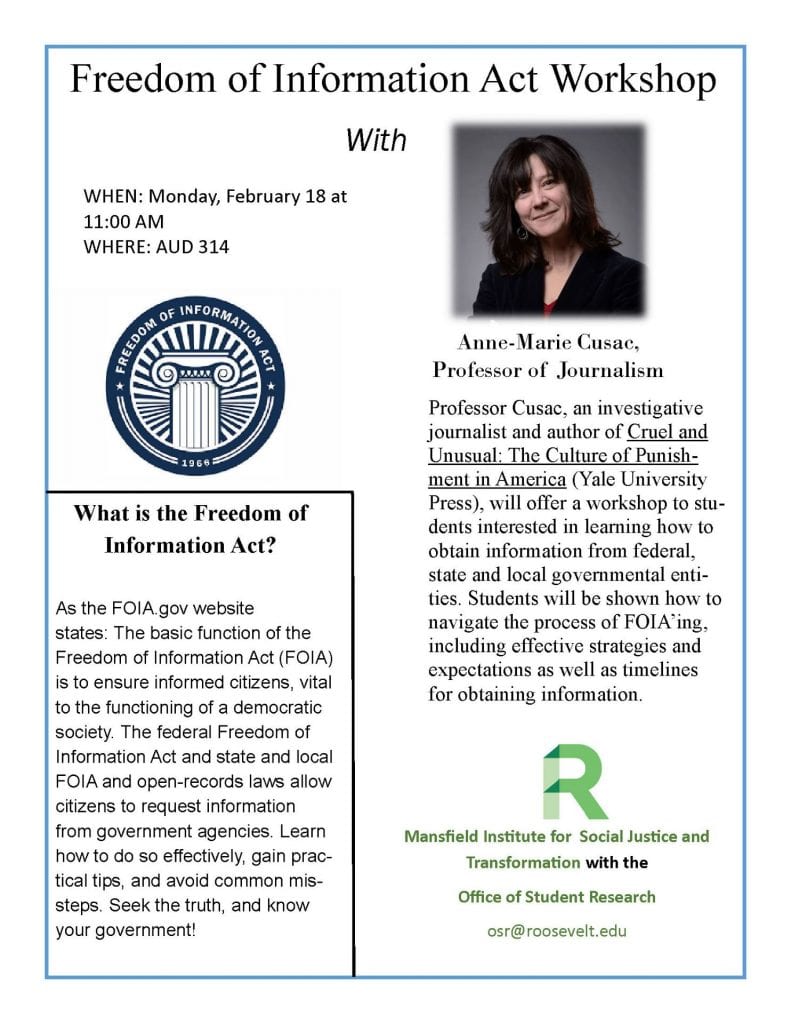
This workshop is ideal for students in my current SUST 340 Policy, Law, & Ethics course, as well as for all SUST and SOC majors. If you’re on campus tomorrow and free at 11, I highly recommend attending! However, if you’re unable to make it, no worries: there will be handouts available — and Prof. Cusac is a good colleague of mine who would be happy to speak with you individually about how FOIA requests could enhance your environmental/sociological research.
Register for Spring/Summer 2019 Classes, & Good Luck with Finals!
As we enter finals week this F18 semester, don’t nelgect your planning for next year’s classes! Advising and registration are ongoing for the Spring & Summer 2019 semesters here at @RooseveltU — and there are still seats left in most of our SUST classes. The Sustainability Studies program is once again offering a wide range of on-campus and online courses for the next two exciting semesters of learning, research, and campus outreach projects!
Students, please look over the Spring 2019 schedule using this coursefinder, check your remaining course requirements, and email or call your assigned academic advisor with your planned schedule and any questions you have about your upcoming classes. Your advisor will help you craft your schedule and provide you with an RU Access registration code so you can register.
Sustainability Studies courses offered in Spring 2018:
SUST 101 Humans & Nature (MW 11am-12:15pm, Bryson)* — Waitlisted
SUST 210 Sustainable Future (T 2-4:30pm, Hoffman)◊
SUST 210 Sustainable Future (8-week online, 1/22-3/18, STAFF)§
SUST 220 Water (8-week online, 3/19-5/13, Jones)§
SUST 230 Food (M 2-4:30pm, Gerberich)◊
SUST 240 Waste (8-week online, 3/19-5/13, Gerberich)§
SUST 250 The Sustainable University (W 2-4:30pm, Bryson)◊
SUST 330 Biodiversity (8-week online, 1/22-3/18, Hoffman)§
SUST 340 Policy, Law, & Ethics (16-week online, Bryson)
SUST 395 Sustainability Studies Internship (by arrangement, Bryson)
* Ideas course in new CORE general education curriculum, effective Fall 2018; recommended for SUST majors and minors!
§ 8-week accelerated online courses; these work great taken back-to-back.
◊ Experiential Learning (EXL) designated courses: satisfy EXL requirement in CORE.
Sustainability Studies courses offered in Summer 2019:
SUST 361 Urban Ecology (5 Saturdays, 7/8-8/5, Pickren)◊ — NEW Course
SUST 390 Rooftop Garden (on-campus + online, 5/28-8/5, STAFF)◊
◊ Experiential Learning (EXL) designated courses: satisfy EXL requirement in CORE.
I know November is a super busy time of the academic year, but be sure to make a little time to get in touch with your advisor to sign up for the classes you need! For additional useful info, see this Advising Resources page here on my faculty website.
Good luck with your final exams, papers, and projects!
RU Students! Apply Now for Funding thru the Office of Student Research
To my RU students and advisees — the new Office of Student Research is currently accepting proposals (due Nov. 15) for student research projects for Spring 2019. See below for details, and check out the OSR website for more info. Contact me via email if you have an idea and want to brainstorm. This is a phenomenal opportunity to get funding do a scholarly, campus- or community-based, and/or creative project and, in the process, build your professional résumé!
The Office of Student Research offers financial and academic support to help students interested in developing and executing research and mission-related creative and scholarly projects. OSR initiatives support students at each stage of the research process, from connecting with mentors and securing funding, to gaining research skills, to sharing results with the Roosevelt University community and beyond. The OSR also provides professional development, graduate school preparation resources, and information on nationally competitive summer programs and fellowships.
Fellowships – The OSR provides several types of fellowship awards to support students engaged in research and mission-related scholarship projects:
Early Research and Scholarship Fellowships ($1,000)
Available to all Roosevelt University students, especially first- and second-year undergraduate students, to begin research and creative scholarship early in their studies.
To learn more about eligibility, the application process, and expectations download the complete pdf guide
- Early Research and Scholarship Application
- Mentor Letter of Support Form
- Learning Agreement
- Budget Request
Advanced Research and Scholarship Fellowships ($2,000)
Available to all Roosevelt University students, especially third- and fourth-year undergraduate students and recent transfer students, to conduct advanced research and complete creative scholarship. Several fellowships are reserved for graduate students who wish to conduct research early in their studies, although fellowships will be approved for thesis completion.
To learn more about eligibility, the application process, and expectations download the complete pdf guide
- Advanced Research and Scholarship Application
- Mentor Letter of Support Form
- Learning Agreement
- Budget Request
Community-based Research Fellowships (Based on funding/project)
Available to all Roosevelt University students who wish to conduct applied, collaborative, community-based research. Students awarded these fellowships will join existing university-community collaborative projects, working as part of a team.
**OSR fellowships are not the only Roosevelt program providing research funding. Honors students should explore research opportunities in the Honors Program. Contact the McNair Scholars Program to learn if you are eligible to participate in this federally-funded program offering research, mentorship, and graduate school preparation resources.
Research and Scholarship Supply Funds – Students awarded a Research and Scholarship Fellowship will receive a stipend. The stipend is intended to provide the student adequate time to complete the project. Students and mentors can apply separately for up to $300-$400 in a research budget.
Research and Scholarship Travel Funds – The OSR provides resources and travel funding for students presenting their work at discipline-based, regional, and/or national conferences. If you need travel money to conduct your research, please consider this when developing your budget.
Service Opportunity in Biodiversity: WeDigBio @ the Field Museum
 Scientists from Field Museum and around the world need your help! Join us in transcribing scientific label data from our collections and from field notes books using online and computer tools. Activities may also include hands-on curation with specimens. This event will be held daily from this Thur 10/18 thru Sun 10/21, 2018 and is based at Field Museum.
Scientists from Field Museum and around the world need your help! Join us in transcribing scientific label data from our collections and from field notes books using online and computer tools. Activities may also include hands-on curation with specimens. This event will be held daily from this Thur 10/18 thru Sun 10/21, 2018 and is based at Field Museum.
* * To register please click here. * *
You will be part of a global effort to digitize centuries of data about life on Earth. Organisms may include ferns, fungi, mosses, insects, and mammals. Participants will have an opportunity to meet Field Museum scientists and join in behind-the-scenes tours or talks about the significance of the scientific collections!
WeDigBio is ideally for teens aged 15+ and adults. Refreshments will be available, but you should feel free to bring lunch. Space is limited; please register in advance.
Details:
- For those attending on-site activities, free admission to the museum will be available after the event.
- Each day there is one session, including registration, the event and tours. Registration will open at 9:30am and the event will be held from 10:00am to 2:00pm.
- Free behind-the-scene tours after the event!
